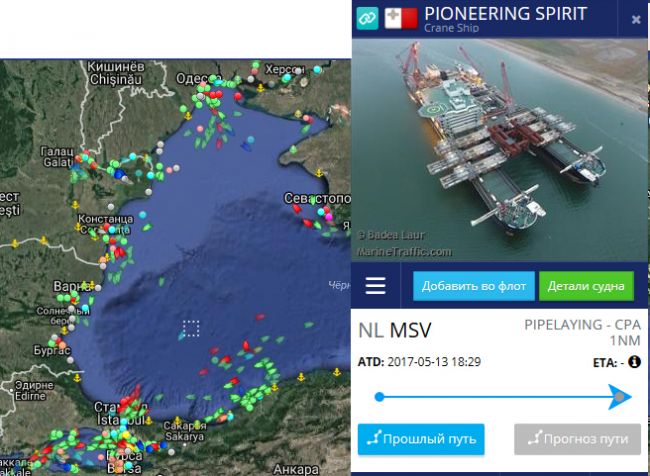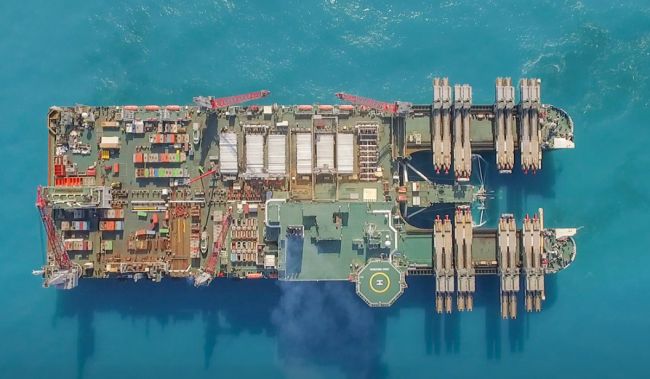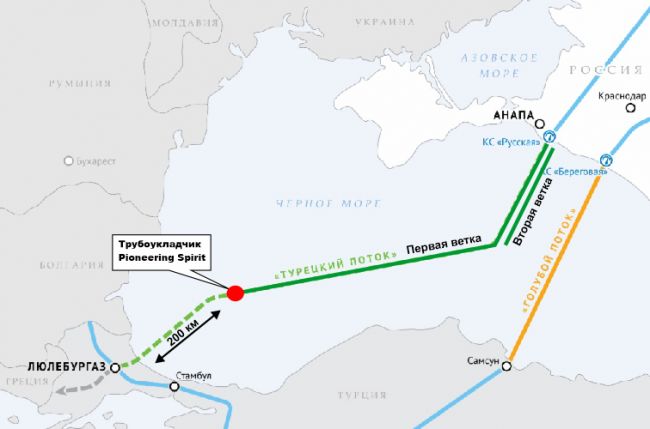Construction of the sea part of the Turkish Stream natural gas pipeline first branch enters its final straight. South Stream Transport B.V., the project’s operator, reported yesterday that it was laid to 706 kilometers long. The total length of each branch of the gas pipeline in the Black Sea is a little more than 930 km. Thus, 76% of works on the first route have already been completed. According to the Marinetraffic navigation portal, on March 2 the Pioneering Spirit pipe-laying vessel was 2,226 km from the shore and was moving with a speed of about 5 km per day.

Photo: marinetraffic.com
Now work is being done in the deep-water part of the Black Sea, where the depth reaches 2,200 meters, after 150 km shallow waters begin.
According to the project operator, the laying of both branches was carried out at 50%, which is more than 930 kilometers.
"On March 6, 50% of the Turkish Stream gas pipeline offshore section was completed. To date, more than 930 km of the gas pipeline in the Black Sea have been laid in total along two branches. By a half-day the Pioneering Spirit vessel, carrying out the deep-water laying of the Turkish Stream, passed a control point of 706 kilometers of the first string. As for the second line, 224 km of the gas pipeline was built in 2017,” they at South Stream Transport B.V. inform.
In the second half of January, the company announced beginning of construction of a receiving terminal for the Turkish Stream gas in Turkey's Kıyıköy on the Black Sea coast. "Preparations for the construction in Turkey have been conducted over the past few years. Since 2015, exploration has been conducted to determine the optimal site for the receiving terminal. The survey results were included in the Environmental Impact Assessment (EIA) report, which was approved by the Turkish Government in September 2017. All the necessary permits to start the work have been received," the operator of the Turkish Stream reported.
Recall that the construction of the "Turkish stream" through the Black Sea, the Russian holding began in May last year.

Welding of the first joint. Photo: turkstream.info
As EADaily reported earlier, at the end of June, while visiting the Pioneering Spirit pipe-laying vessel, Gazprom CEO Alexei Miller told the Russian president that the construction of the first branch of the Turkish Stream would be completed in March this year and the second in 2019.

Pioneering Spirit pipe-laying vessel. Photo: turkstream.info
Two branches of the Turkish Stream gas pipeline will ensure the supply of 31.5 billion cubic meters of gas per year, bypassing Ukraine. Through the first branch 12 billion c m of gas will flow to the domestic market of Turkey, and the remaining 3.5 billion cubic meters, as stated by the Turkish authorities, will be submitted to the currently under construction Southern Gas Corridor from Azerbaijan to Greece and Italy.
As for the second branch of the Turkish Stream, all gas is planned to be supplied to Europe. Two variants of gas supply are considered. One way is through Greece to Italy. The other one is to Austria, Hungary and Serbia through Bulgaria.
As reported in Gazprom, last year the holding increased gas supplies to potential consumers of the Turkish Stream. Gas supplies to Turkey increased by 17.3%, Greece - by 9.3%, Bulgaria - by 4.7%, Hungary - by 21.3%, and Serbia - by 21.2%.
Recall that the Blue Stream gas pipeline from Russia to Turkey has already been laid across the Black Sea. Gazprom built it in 2002. Last year about 16 billion cubic meters of gas was supplied via the 1,213-kilometer-long pipeline.
The construction of the Turkish Stream will be a damaging blow to Ukraine. "For Ukraine, the implementation of this project will have negative impact, not as great as from the Nord Stream, but the loss of about 15 billion cubic meters of transit from current 70 billion cubic meters is a very large number," the head of Naftogaz Andriy Kobolyev Ukraine reported earlier. Last year, Ukraine received about $3 billion for the transit of Russian gas, and construction of the Nord Stream 2 and Turkish Stream will reduce the revenues by 4-5 times.
The topic of bypassing gas pipelines became even more urgent after the February decision of the Arbitration Institute of the Stockholm Chamber of Commerce, which Gazprom perceived as unjust and announced the start of procedure of termination of gas supplies and transit contracts with Naftogaz of Ukraine.

 Alexander Lukashenko addressed the Prime Minister of Russia
Alexander Lukashenko addressed the Prime Minister of Russia Trump called Zelensky the owner of the Ukrainian traveling circus
Trump called Zelensky the owner of the Ukrainian traveling circus The Russian Armed Forces began using new subsonic cruise missiles with a range of 1,500 km — GUR
The Russian Armed Forces began using new subsonic cruise missiles with a range of 1,500 km — GUR The People's Artist of Russia will have to answer for the fighting character of millions
The People's Artist of Russia will have to answer for the fighting character of millions Medvedev about the United States and its allies: Pigs do not want to part with the trough
Medvedev about the United States and its allies: Pigs do not want to part with the trough Ex-CIA officer: Israel has nuclear weapons and it will use them
Ex-CIA officer: Israel has nuclear weapons and it will use them